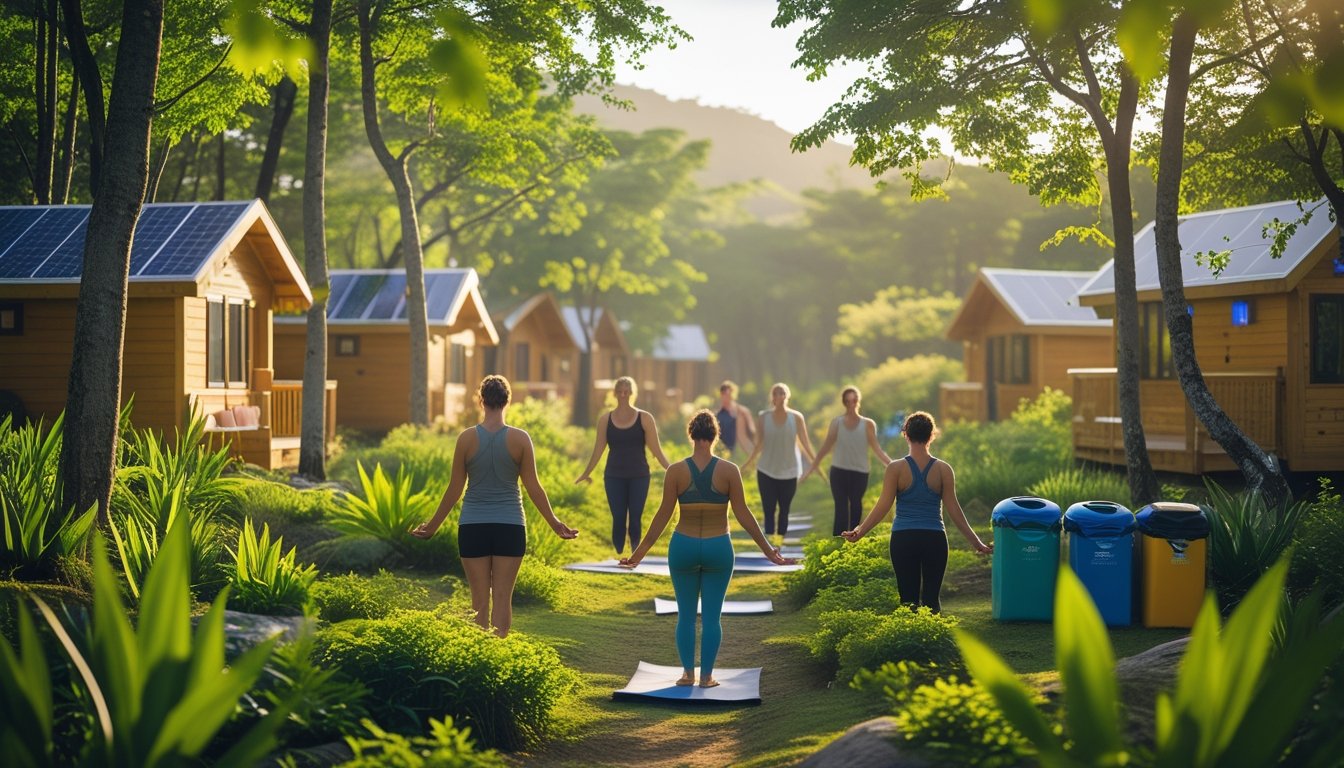Late updated: 30 Sep 2025 15:09
Written by: Ella Thompson
Exploring Sustainable Nature Retreats for Enhanced Mental Wellbeing
In our fast-paced world, the need for mental wellbeing has never been more critical. Exploring sustainable nature retreats offers a refreshing escape that enhances mental health while promoting eco-friendly practices. These retreats allow us to immerse ourselves in natural beauty, providing a sanctuary for the mind and soul. By combining relaxation with sustainability, they create an environment where we can disconnect from daily stress and reconnect with nature.

At sustainable nature retreats, we find a range of enriching activities designed to foster mindfulness and relaxation. From guided meditation sessions amidst scenic landscapes to outdoor eco-therapy practices, each experience focuses on rejuvenating our mental state. These retreats invite us to consider how aligning our values with our actions can improve our wellbeing and inspire a deeper appreciation for the environment.
Joining a sustainable nature retreat serves more than just our mental health needs; it represents a commitment to preserving the planet. By choosing retreats that prioritise conservation, we contribute to a holistic wellness journey that benefits both us and future generations. Discover how these retreats lay the foundation for mental clarity and emotional richness, inviting us to step into a world where sustainability and personal health progress hand in hand.
Key Takeaways
- Sustainable nature retreats enhance mental health and promote eco-friendly practices.
- Activities like meditation and eco-therapy foster mindfulness and relaxation.
- Choosing these retreats supports personal wellbeing and environmental preservation.
Key Elements of Sustainable Nature Retreats for Mental Wellbeing

In sustainable nature retreats, key aspects such as eco-friendly designs, mental health benefits from nature immersion, mindfulness practices, and eco-conscious accommodations significantly contribute to mental wellbeing. Such retreats offer a harmonious blend of sustainability and holistic health approaches, promoting relaxation and ecological awareness.
Sustainability Principles in Retreat Design
Sustainable nature retreats focus on integrating eco-friendly principles in their design and operation. Key features often include the use of renewable energy sources such as solar or wind power, and implementing waste-reduction practices. Water conservation methods, like rainwater harvesting systems, are commonly employed to preserve vital resources.
Furthermore, these retreats are designed to be minimally invasive to the local ecosystem. Environmentally conscious architectures utilise materials that blend with natural surroundings, ensuring minimal disruption to local flora and fauna. By prioritising sustainable development, retreats provide a nurturing environment for both human wellbeing and ecological health.
Benefits of Nature Immersion for Mental Health
Nature immersion stands at the core of sustainable retreats, providing numerous benefits for mental health. Engaging with natural surroundings has been shown to reduce stress, enhance mood, and increase overall feelings of wellbeing. We can appreciate the tranquillity of forests, the soothing sound of streams, and the fresh air that fosters mental clarity and emotional stability.
Nature offers a break from the digital world, allowing us to rejuvenate and restore mental balance. Exposure to green spaces encourages physical activity, which, in turn, improves mental health by releasing endorphins and reducing anxiety. Nature's calming effect supports a profound sense of peace and psychological resilience.
Mindfulness Practices and Holistic Activities
Mindfulness practices and holistic activities feature prominently in these retreats, designed to cultivate mental clarity and emotional balance. Yoga sessions, meditation workshops, and guided nature walks promote mindfulness, encouraging participants to stay present and engage with their surroundings more deeply. These activities foster a greater awareness of one’s mental and physical state, facilitating holistic health.
Holistic activities such as tai chi or sound healing enhance relaxation and mental focus. Retreats often offer workshops that integrate local cultural elements, providing unique, enriching experiences that align with eco-conscious travel. Participants leave with tools to maintain mindfulness and mental wellbeing beyond the retreat.
Eco-Friendly Accommodations and Local Biodiversity
Accommodations in sustainable retreats are designed with an emphasis on ecological considerations. Eco-friendly lodging minimises environmental impact, using sustainable materials and green technologies. Structures might utilise energy-efficient systems, natural ventilation, and eco-friendly toiletries to reduce the carbon footprint.
Engagement with local biodiversity is encouraged, often including native plant gardens or conservation projects. Participants learn about local ecosystems’ importance and are involved in activities that support biodiversity. By choosing eco-conscious lodgings and engaging with the local environment, guests contribute to preserving natural beauty while enhancing their own mental wellbeing.
Experiences and Activities Enhancing Wellbeing at Sustainable Retreats

At sustainable nature retreats, a variety of activities are offered that allow us to connect deeply with nature and improve our mental wellbeing. From the calming effects of forest bathing to the clarity brought by a digital detox, these experiences are designed to nurture our mental health and provide genuine relaxation.
Forest Bathing and Shinrin-Yoku
Forest bathing, or shinrin-yoku, provides an immersive experience that helps us reconnect with the natural world. This practice, originating in Japan, involves leisurely walks through forested areas, heightening our awareness and encouraging mindfulness.
We engage our senses by focusing on the sights, sounds, and smells of the forest environment. Research has shown that this activity can reduce stress levels, lower blood pressure, and improve mood. Unlike a typical hike, the goal is to slow down and absorb the environment without a specific endpoint in mind. It’s about being present in nature and appreciating the simple beauty around us.
Yoga and Meditation for Stress Reduction
Yoga and meditation are integral to many sustainable retreats, promoting stress reduction and overall mental clarity. Offering a break from daily routines, retreats provide a peaceful setting to practice these ancient disciplines.
Yoga helps enhance physical fitness and flexibility while cultivating mental balance. With yoga sessions held outdoors, we can connect with nature during our flow. Meditation sessions offer tranquillity, allowing us to focus inwardly and develop sustained mindfulness practices. These practices can lead to significant improvements in handling stress and enhancing mental focus, offering a holistic approach to wellbeing.
Outdoor Activities: Hiking, Nature Walks, and Fitness
Outdoor activities like hiking, nature walks, and fitness classes offer opportunities for physical rejuvenation and mental relaxation. Immersing ourselves in natural landscapes allows us to experience the beauty of national parks or local trails.
While engaging in these activities, we gain not only physical fitness but also a clearer mind. The act of walking through the wilderness or paddleboarding on serene waters invites a meditative state of awareness. Hiking challenging trails can also foster a sense of achievement and boost self-confidence. These eco-friendly activities promote both personal wellbeing and environmental appreciation.
Digital Detox and Mindful Journaling
Digital detoxing helps us disconnect from technology, reducing screen time and digital fatigue. At retreats, there are opportunities to set aside devices, fostering deeper connections with those around us and our surroundings. We focus on being mindful and present without constant digital distractions.
Mindful journaling complements this process by encouraging us to reflect on our thoughts and experiences. Journaling in nature unleashes creativity and supports mental clarity. By combining these practices, we cultivate a sense of inner peace that can extend into our everyday lives. This intentional break from technology allows us to recharge mentally and emotionally, enhancing overall wellbeing.
Frequently Asked Questions

Sustainable nature retreats offer unique opportunities to enhance mental wellbeing through environmentally conscious practices and serene natural settings. They combine elements of mindfulness with eco-friendly accommodation to reduce stress and anxiety effectively.
What are the essential elements to look for in a sustainable nature retreat focused on mental wellbeing?
When selecting a retreat, choose locations that prioritise environmental conservation and offer eco-friendly amenities. Look for programmes that integrate mindfulness activities and provide guidance from mental health professionals. Accommodation should respect natural landscapes and utilise sustainable resources.
How does immersion in natural settings contribute to improved mental health?
Being surrounded by nature helps us to disconnect from daily stressors and fosters a sense of peace. This exposure promotes mental clarity, relaxes the mind, and offers opportunities for contemplation and emotional healing. Furthermore, it encourages positive mental habits.
What activities are commonly offered at nature retreats that support mindfulness and mental restoration?
Nature retreats typically include activities such as guided meditation, yoga, and nature walks. These are designed to promote mindfulness and relaxation. Wildlife observation and ecotherapy sessions may also be featured, encouraging introspection and a deeper connection with the natural world.
Can sustainable nature retreats have a significant impact on reducing stress and anxiety levels?
Yes, these retreats can significantly reduce stress and anxiety by offering a peaceful environment where we can practice mindfulness and connect with nature. Engaging in structured activities designed to reduce tension complements the tranquil settings to maximise their benefits.
What are the best practices for eco-friendly accommodation and amenities at nature retreats?
Eco-friendly retreats utilise sustainable building materials, solar energy, and waste management systems to minimise their environmental impact. Accommodation often includes natural ventilation, organic bedding, and locally sourced food. Facilities should integrate seamlessly within the environment to maintain the balance with nature.
How can individuals maximise the mental health benefits of attending a nature-based wellbeing retreat?
To fully benefit, participants should actively engage in offered activities and immerse themselves in the natural environment. It is valuable to remain present, practice mindfulness, and embrace opportunities for personal reflection and growth while attending such retreats.
